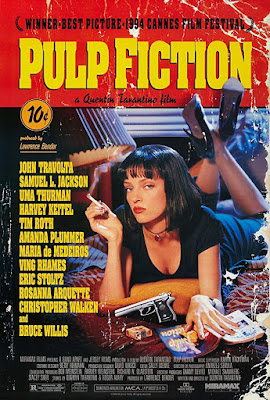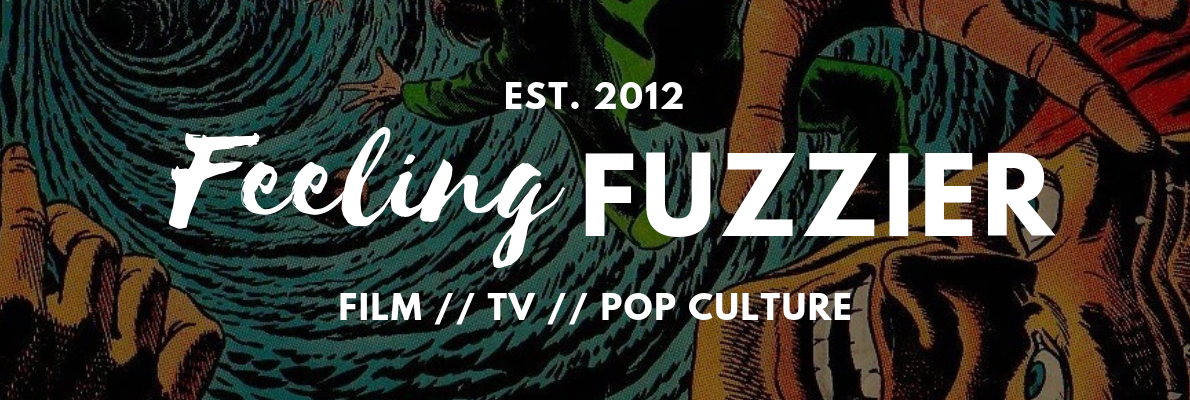Quentin Tarantino's Pulp Fiction celebrates its 25th anniversary this month.
From the jangly opening notes of 'Misirlou' (which has only been slightly blighted by its sampling by the Black Eyed Peas), Pulp Fiction feels energetic and urgent.
Like his debut, Tarantino employs a number of unconventional narrative and storytelling techniques in Pulp Fiction; essentially a trilogy of stories stacked on top of one another, with characters floating in and out of the winding narrative, the film employs non-linear storytelling, extreme and sudden bursts of violence and vulgarity, a funky blues soundtrack and reams and reams of pop culture references. It's a homage to gritty crime films from yesteryear; a singular vision from a filmmaker obsessed with reimagining, reworking and reviving his own favourite films and storytelling techniques.
I was a relative latecomer to Pulp Fiction; I didn't get around to watching it until I was already familiar with many of its 'iconic' moments, such as the dance sequence at Jack Rabbit Slims or Samuel L Jackson's famous Ezekiel monologue. As a result, I found the bits in-between were sort of strung out, merely filling in the gaps between these moments. When I first watched it, I was surprised that Mia and Vincent's story was done and dusted in the first hour! Meanwhile, the whole subplot with Butch (Willis) and Marsellus (Ving Rhames) felt like it started and ended nowhere – was this really what everyone was ranting and raving about?
It wasn't until I revisited it a second time that the greatness of these moments between moments started to sink in. Yes, the dance scene is iconic. But it's the dialogue-driven scenes beforehand, and following it, that enshrine Pulp Fiction as a true classic. Tarantino's prose has never been as entrancing or as compelling as it is here (although you could make a strong case for Inglourious Basterds)
Even when his characters are essentially 'shooting the shit' and discussing foot massages or European burger terminology, your attention rarely wavers from the screen. These flights of fancy are freewheeling, but not indulgent.
 Often it's the dialogue which feels completely unrelated to the plot or doesn't advance the narrative whatsoever (of which there is a lot!) that feels the most revealing, essential or memorable.
Often it's the dialogue which feels completely unrelated to the plot or doesn't advance the narrative whatsoever (of which there is a lot!) that feels the most revealing, essential or memorable.What's more, these seemingly tangential diversions serve a purpose – sometimes obvious, sometimes not so much. But they're there, for those looking for them. They flesh out the world and its characters; building them up or sometimes just to establish a gag later down the track. This isn't something that can be said of every Tarantino film – The Hateful Eight springs to mind – but Pulp Fiction is an example of where it's pitch perfect.
Following its premiere at the Cannes Film Festival, Pulp Fiction enjoyed huge success, riding a wave of word of mouth to box-office success to cement itself as the "Star Wars or Jaws of independent cinema". It spawned its fair share of imitators in the years that followed – ironic, given how much the film itself owes and imitates other movies.
For me, it's far from my favourite Tarantino film. Maybe because I came late to the party, but also because it comes down to personal preference – a Tarantino gangster movie isn't my jam in the same way a Tarantino war movie or westerns is my jam. But I can appreciate Pulp Fiction for what it is; I can appreciate the innovation and the celebration it exhibits. Tarantino has gone onto make films I enjoy more, but nothing will come close to this in terms of immediate cultural impact,
Quentin Tarantino's tenth film, Once Upon a Time in Hollywood, premiered at the Cannes Film Festival earlier this week, and opens in cinemas across Australia this August.




No comments:
Post a Comment